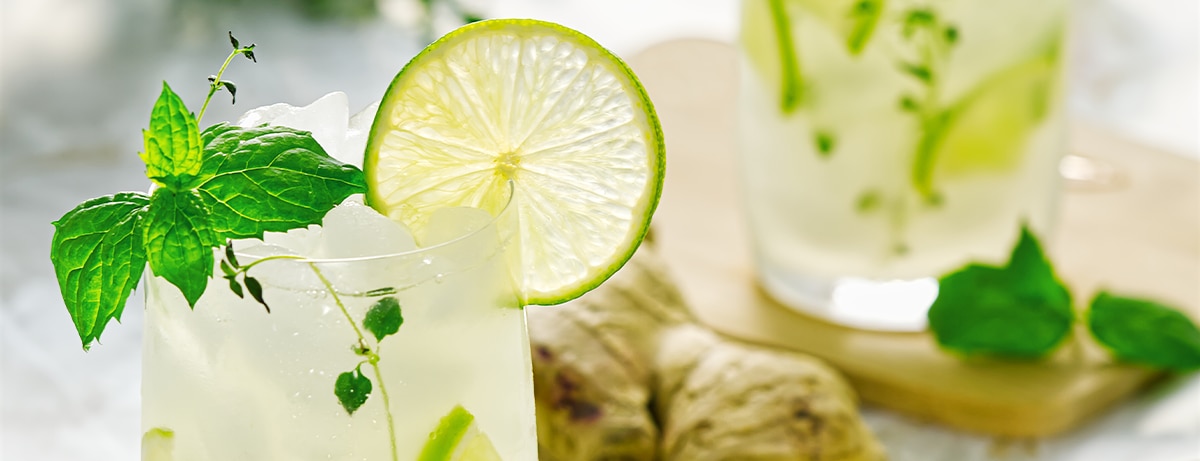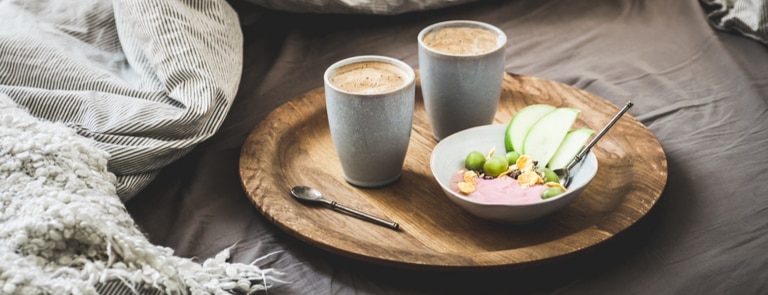15% off £25 or 20% off £35
Code:BASKET
Blocked up? Natural ways to ease constipation

From holiday tummy troubles to everyday sluggishness, constipation happens to most of us. If you’ve ever felt low-key jealous of people who ‘go’ daily, you’re not alone - but a few simple tweaks could
Summary
1Why constipation happens
Constipation is pretty common, and it affects people of all ages for all sorts of reasons…
2Ways to ease constipation naturally
Although chronic or long-term constipation may require medical advice, occasional bouts can often be dealt with using natural methods…
3How to ease stomach pain from constipation
While the best way to tackle the pain is to address the constipation itself, you can also take painkillers like paracetamol to ease discomfort in the
Constipation isn’t exactly anyone’s favourite topic – but it’s something most of us deal with at some point. It can feel uncomfortable, frustrating, and even painful. And while everyone’s bathroom routine is a little different, if you’re finding it harder to poo or going less often than usual, chances are you might be constipated.¹
But what causes constipation in the first place? And more importantly, what can you do about it? Let’s find out.
What causes constipation?
Constipation is pretty common, and it affects people of all ages for all sorts of reasons.1
You could be dealing with constipation if:1,2
- you’re having fewer bowel movements than usual (especially if it’s fewer than three times a week)
- your stools are lumpy, dry or hard
- you’re straining to go you feel like
- you haven’t fully emptied your bowels
- you’re also feeling sick, bloated or experiencing stomach pain
Constipation can be grouped into two categories – functional and neurogenic – and understanding the difference can help you tackle it head-on.3
Functional constipation is the most common form and isn’t caused by any identifiable structural or neurological condition.³ Instead, it can stem from factors like diet, low fluid intake, physical inactivity or bowel habits.
Neurogenic constipation happens when nerve-related conditions, such as Parkinson’s disease or a stroke, interfere with bowel movements.³
Since functional constipation affects most people, let’s focus on that.³ It happens when food moves sluggishly through your intestines, making going to the bathroom a struggle.⁴
But what’s behind it? Here are some common culprits:1,4,5
- too little fibre in your diet
- not drinking enough water
- lack of activity
- imbalances in the gut microbiome
- psychological factors such as stress, anxiety or depression
- certain medication
- pregnancy
- genetics
The good news? Although some of these factors aren’t easy to change, many of them are within your control. Laxatives from your doctor can help, but in many cases, you can relieve constipation naturally – no medication required.6
That said, if you’re experiencing tummy pain or find yourself regularly constipated, it’s best to speak to your doctor to rule out any underlying issues.

How to ease constipation at home
Although chronic or long-term constipation may require medical advice, occasional bouts can often be dealt with using natural methods.1,6 Let’s explore some of the ways to ease constipation without turning to medication.
When it comes to constipation, the first thing to think about is your diet, especially how much fibre you’re eating.1,6 But what is fibre, and why does it matter?
Fibre is the part of plant foods – things like fruits, vegetables, beans, grains, nuts and seeds – that your body can’t fully digest or absorb.7,8
There are two types of fibre: soluble fibre (which absorbs water) and insoluble fibre (which doesn’t).⁸ Both play an important part in digestion as they move through your intestines – soluble fibre helps draw water into your stool, making it softer and easier to pass.⁷˒⁸ Insoluble fibre can also speed up how quickly your stool moves through your gut, helping things move along more smoothly.⁷˒⁸
So, boosting your intake of both soluble and insoluble fibre can help with constipation symptoms.1,6-9 In fact, adults should aim for 30g of fibre a day.6
Need help choosing the right foods or learning about fibre supplements? Take a look at our guide on the best high-fibre foods.9
It’s a good idea to take it slow. Too much fibre too quickly can lead to bloating, flatulence (farting) and discomfort.6,7 So, ease into it and let your gut adjust.
Sorbitol is a type of sugar alcohol found in plants, especially in fruits like apples, pears, apricots, grapes, plums, raspberries and strawberries.6,10
As your body can’t fully digest sorbitol, it stays in the gut, helping increase the water content of your stools – making it easier to pass them.10 These properties can make sorbitol an effective natural ingredient to keep constipation at bay.6,10
So, regularly getting your recommended five fruits and vegetables a day and including some sorbitol-rich fruits may help keep things moving.6,10
Fluids help keep your stool soft and easy to pass, so it’s no surprise that not drinking enough can lead to constipation.4,5
Make sure you’re drinking 6–8 cups or glasses of fluids every day – whether it’s water, soft drinks or hot drinks.1,6,11 It’s even more important to drink enough if you’re prone to dehydration.6
For some hydration inspiration, check out our guide on easy ways to drink more water.
Getting out for a daily walk or run can really help get things moving.1,6
Unsure how much you should be exercising? Aim for at least the NHS-recommended 150 minutes of moderate or 75 minutes of high-intensity exercise per week, plus strength training at least twice a week.6,12
You can spread your workouts over a few days, but it’s best if you can move your body every day.1,12 Try to reduce the time you spend sitting or lying down, and break up any long stretches of not moving with some activity, like a walk or moving around the house.1,12
A good routine can help keep your bowel movements regular.1,6 Give yourself enough time and make sure you’re not in a rush.6 It’s good to establish a regular time and place to go – consistency is key.
It’s also important to make sure you’re completely finished before getting up from the toilet.1,6
However, experts suggest that if you can’t go within five minutes of starting, you should probably stop and do something else, and come back and try again later.
When you feel the urge to go, don’t wait. Head to the toilet and try as soon as possible.1,6
The right positioning can also help. If you’re struggling, try resting your feet up on a stool so your knees are above your hips – this can naturally reduce resistance and make it easier to open your bowels.1

Do “natural laxatives” exist?
If the lifestyle changes we’ve talked about haven’t done the trick, it may be time to try a laxative.6 These medications help get things moving, and a pharmacist or GP can advise you on the different options that are suitable for you.1
One popular option is psyllium husks (also known as ispaghula husks), derived from the Plantago species of plants.13 They’re rich in natural fibre, which helps soften stool and makes it easier to open your bowels.13
You can find this natural laxative as a gel-like product at pharmacies or as a diet supplement at health food stores and supermarkets.13,14
‘Chia showers’ are another natural remedy for constipation that’s recently become popular on TikTok. A chia shower involves mixing a couple of tablespoons of chia seeds into a glass of water, adding some lemon juice and drinking it on an empty stomach.15
As chia seeds are packed with fibre, they may help keep your bowel movements regular.15,16 But avoid consuming large amounts of chia seeds, as they can form a gel that (in rare cases) can block your intestines.15
While we’re on the topic of trends, aloe vera juice is another popular natural remedy for constipation.17
But does it really work? Find out in our article investigating aloe vera and gut health.
Although natural remedies may help with opening your bowels, constipation isn’t just about struggling to go – it can also bring bloating, discomfort and stomach pain.1,6 Let’s talk about ways to ease those symptoms.
When to seek medical advice with constipation
Constipation is usually nothing to worry about, but there are times when it’s best to get checked out. It can sometimes cause stomach pain, bloating, and even a reduced appetite.¹˒⁶ But if you’re experiencing pain alongside constipation, it’s important to speak to your GP rather than self-managing with painkillers. A doctor can help work out what’s causing your symptoms and decide on the safest treatment for you.¹
You should also make an appointment with your GP if:¹
- constipation continues despite lifestyle changes
- it has lasted a long time
- you’ve unintentionally lost weight
- you’re often bloated there’s blood in your stools
- you frequently feel tired
- you’re taking medication that can cause constipation (such as opioid painkillers)
- your bowel habits have suddenly changed
Checking in with your doctor can help rule out anything more serious and ensure you get the right treatment, whether that’s prescription laxatives, further tests, or tailored advice.1,16,18
The final say
No one likes being constipated, but small tweaks to your diet and daily routine may help get things moving – without the need for laxatives. If your symptoms persist, seek advice from your GP.1,6,18
Want to learn more about the causes of constipation and how to avoid it? Check out our guide to the laxative effects of magnesium for expert tips and advice.
Disclaimer - The advice in this article is for information only and should not replace medical care. Please check with your GP or healthcare professional before trying any supplements, treatments or remedies. Food supplements must not be used as a substitute for a varied and balanced diet and a healthy lifestyle.
While we strive for accuracy and balance, please be aware that this article may discuss products available for purchase through Holland & Barrett. Consult a healthcare professional before making any health-related decisions.
1. NHS. Constipation. [Internet]. [cited 2025 Feb 24]. Available from: https://www.nhs.uk/conditions/constipation/
2. NHS Inform. Constipation symptoms and treatments [Internet]. [cited 2025 Feb 24]. Available from: https://www.nhsinform.scot/illnesses-and-conditions/stomach-liver-and-gastrointestinal-tract/constipation/#symptoms-of-constipation
3. Dowden A. The impact of chronic constipation in adults. Prescriber. 2021;32(11–12):25–8. https://doi.org/10.1002/psb.1954
4. Włodarczyk J, et al. Current overview on clinical management of chronic constipation. J Clin Med. 2021;10(8):1738. https://doi.org/10.3390/jcm10081738
5. Werth BL, et al. Potential risk factors for constipation in the community. World J Gastroenterol. 2021;27(21):2795–817. https://doi.org/10.3748/wjg.v27.i21.2795
6. NICE. Scenario: Constipation in adults [Internet]. [cited 2025 Feb 24]. Available from: https://cks.nice.org.uk/topics/constipation/management/adults/
7. van der Schoot A, et al. The effect of fiber supplementation on chronic constipation in adults: an updated systematic review and meta-analysis of randomized controlled trials. Am J Clin Nutr. 2022;116(4):953–69. https://doi.org/10.1093/ajcn/nqac184
8. Guts UK [Internet]. Fibre [cited 2025 Apr 2]. Available from: https://gutscharity.org.uk/advice-and-information/health-and-lifestyle/fibre/fibre-information/
9. Erdogan, Askin, et al. Randomized clinical trial: soluble/insoluble fiber or psyllium for chronic constipation. Alimentary Pharmacology & Therapeutics. 2016; 44(1):35. https://doi.org/10.1111/apt.13647
10. Katsirma Z, et al. Fruits and their impact on the gut microbiota, gut motility and constipation. Food Funct. 2021;12(19):8850–66. https://doi.org/10.1039/D1FO01125A
11. NHS. The Eatwell Guide. [Internet]. [cited 2025 Mar 19]. Available from: https://www.nhs.uk/live-well/eat-well/food-guidelines-and-food-labels/the-eatwell-guide/
12. NHS. Physical activity guidelines for adults aged 19 to 64 [Internet]. [cited 2025 Feb 24]. Available from: https://www.nhs.uk/live-well/exercise/physical-activity-guidelines-for-adults-aged-19-to-64/
13. Agrawal. Psyllium: A source of dietary fiber. Dietary Fibers. IntechOpen; 2022. Available from: https://www.intechopen.com/chapters/78644
14. NHS. About Fybogel (ispaghula husk) [Internet]. [cited 2025 Feb 24]. Available from: https://www.nhs.uk/medicines/fybogel-ispaghula-husk/about-fybogel-ispaghula-husk/
15. National Capital Poison Center. Is the “internal shower” drink from TikTok safe? [Internet]. [cited 2025 Feb 24]. Available from: https://www.poison.org/articles/internal-shower
16. Motyka S, et al. Health-promoting approaches of the use of chia seeds. J Funct Foods. 2023;103:105480. https://doi.org/10.1016/j.jff.2023.105480
17. Shen X, et al. Treatment of constipation with Aloe and its compatibility prescriptions. Chinese Herbal Medicines. 2024;16(4):561–571. https://doi.org/10.1016/j.chmed.2024.07.005
18. NHS Inform. Constipation symptoms and treatments [Internet]. [cited 2025 Feb 24]. Available from: https://www.nhsinform.scot/illnesses-and-conditions/stomach-liver-and-gastrointestinal-tract/constipation/#treating-constipation












